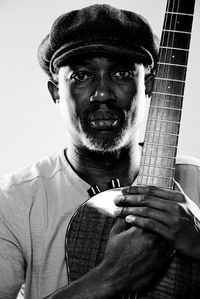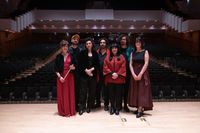05.06 | NAWA ECHOES | Porgy & Bess
8:30 pm
Becaye Aw & Inner Unity Ensemble
Becaye Aw: vocals & guitar
Valentina Bellanova: Ney
Shabnam Parvaresh: clarinet
Uygur Vural: cello
Amir Wahba: percussion
Mahan Mirarab: guitar, arrangements
Becaye Aw is a guitarist, singer, and songwriter from the Fulani (Haal Pulaar) community. He was born in Mauritania in 1963 and spent his childhood in Dakar, Senegal. There, he began playing the guitar, largely self-taught. After learning basic guitar techniques from a Serer musician, he developed his own style by listening to recordings and radio broadcasts. His African approach to guitar tuning and playing style produces a sound similar to that of the kora.
© Øyvind Eide
9:20 pm
Sakina Teyna & Inner Unity Ensemble
Sakina Teyna: vocals
Shabnam Parvaresh: clarinet
Valentina Belanova: Ney
Uygur Vural: cello
Amir Wahba: percussion
Mahan Mirarab: guitar, arrangements
Yalda Yazdani: Curator
Sakina Teyna, born in 1973 in Varto, Turkey, is a Kurdish-Alevi singer and activist. Due to cultural repression, she encountered Kurdish music only during her university years, joining the Mesopotamian Cultural Center in Istanbul in 1991. Political pressures forced her into exile in Austria in 2006, where she resumed her musical career. In 2011, she co-founded the all-female Trio Mara, blending traditional Kurdish songs with Western classical elements. The trio's 2013 album "Deri / Behind the Doors" received critical acclaim. Sakina also collaborated with the Anadolu Quartet, resulting in the live album "Köprü / The Bridge." In 2015, she formed Sakina & Friends, a multicultural ensemble reflecting her commitment to women's rights and cultural diversity. Her music, performed in multiple languages, bridges Eastern and Western traditions, emphasizing themes of resistance and resilience.
The Inner Unity Ensemble was founded in early 2023 and brings together musicians from various diasporas living in Europe. Their goal is to combine musical traditions from Iran, Turkey, and Arab countries with European classical and jazz elements. They critically examine the term "world music," which often homogenizes the diversity of non-European musical traditions. Instead, they strive for equal recognition of all cultures. Their repertoire is based on modal and microtonal concepts such as the Iranian radif and Arabic and Turkish maqams, complemented by European harmony and improvisational elements. Rhythm and dance play a central role in their arrangements. The ensemble regularly collaborates with female singers from various regions to strengthen women's voices in music.
© Derya Schubert
10:10 pm
Reza Koolaghani
Reza Koolaghani: Vocals & Guitar
Amir Wahba: Percussion
Mahan Mirarab: Guitar, Arrangements
Reza Koolaghani is an Iranian singer and musician known for his fusion of traditional Iranian folk music with various global genres. Born in Bandar Abbas, he relocated to Tehran to pursue his musical career, navigating the challenges of Iran's underground music scene. With the gradual relaxation of cultural politics, he emerged as a prominent figure in Iran's contemporary music landscape.
In 2014, Koolaghani co-founded the Iranian band Damahi, which blends southern Iranian folk music with jazz, rock, reggae, flamenco, Afrobeat, Latin, funk, and Indian music.
Koolaghani's music is characterized by its passionate and intense delivery, often reflecting themes of longing and social commentary. His performances have been featured in various international venues, showcasing the rich musical heritage of southern Iran.


